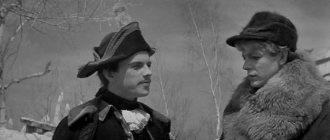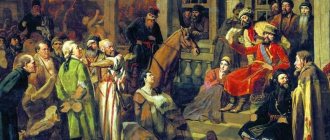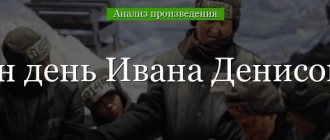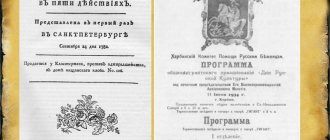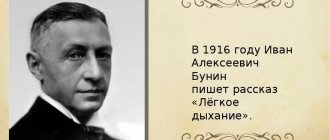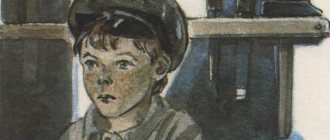“The Captain's Daughter” is one of the most famous works of A. S. Pushkin in prose. The writer himself classified his work as a story by genre, but, nevertheless, “The Captain's Daughter” has all the features of a novel: the action of the work covers a long period of time in the lives of the characters, the book has many minor characters who are not related to the main storyline and finally, over the course of the story, the reader observes the moral and spiritual evolution of the characters.
Main characters
Petr Grinev | From the very beginning, Pyotr Andreich Grinev appears in the work as a poorly educated, kind young man of 16 years old. But “The Captain's Daughter” is a story about growing up. Having fallen in love with the daughter of the fortress captain, Marya Mironova, Grinev discovers masculinity, honesty and courage in himself. The image of the hero is transformed: from a boy he turns into a man. Detailed characteristics of Grinev. |
Marya Mironova | The daughter of the commandant of the fortress, where Pyotr Grinev served in the military. In the first chapters of the story, she appears before the readers as a young girl of eighteen years old. Subsequently, when Pugachev captured the fortress and executed her parents, she shows all her best qualities: she finds the courage to go to St. Petersburg and beg the empress herself for mercy towards the “traitor” Grinev. Detailed description of Masha Mironova. |
Savelich | In “The Captain's Daughter” the heroes admire not only their valor, but also their humanity. Kindness and loyalty are qualities that captivate Pushkin and the reader with their “soft” power. He has a big heart, behind whose kindness lies great courage: Savelich is not afraid of death and asks the formidable Pugachev to save Grinev’s life. Pugachev did not execute the old man, because such dedication evokes in him a feeling of deep respect. He also spared Peter. Detailed description of Savelich. |
Emelyan Pugachev | An analysis of Pugachev’s image must be carried out keeping in mind that history is written by the victors. In the eyes of the authorities, he is a state criminal. But Pushkin does not paint his image in purely dark colors. He admires Pugachev’s fortitude, his honesty and courage, preserving the features of a real prototype in the literary hero. Detailed characteristics of Pugachev. |
Alexey Shvabrin | Throughout the story, the description of the hero Alexei Shvabrin changes. At the beginning, Alexei and Peter seemed to have similar characteristics. Both are officers, both are thoughtlessly wasting their youth. But after a series of events it becomes obvious that the characters are completely different. Shvabrin achieves everything only through cunning and meanness. He is arrogant and spiteful. He does not hesitate to break his oath and go over to Pugachev’s side. Detailed characteristics of Shvabrin. |
Minor characters
There are also several minor characters in the story who play an important role in the plot and in the moral evolution of Pyotr Grinev and Masha Mironova. Using the example of the characteristics of the heroes of The Captain's Daughter, you can see how people grow up, learn to defend their moral positions, make moral choices and fight for their happiness. The story highlights the conflict of generations, irresponsibility, issues of honor, treason and officer's duty.
Catherine II
Catherine II led the Russian Empire during the peasant revolt of 1773-1775. In the story she is presented as a formidable and unyielding, but fair ruler. The reader is shown two contrasting images of Catherine II:
- a simple woman in a dressing gown to whom Masha Mironova pours out her soul in Tsarskoe Selo, without recognizing the empress;
- a confident and formidable ruler, capable of suppressing an uprising, who severely punishes officers who betray their oath.
In the finale, Catherine II grants Peter a pardon after listening to his beloved's story about sincere feelings and loyalty to an officer's duty. Thus, the author shows that despite the harsh measures that had to be taken to suppress the peasant uprising, the empress is capable of understanding and mercy.
Captain Mironov
Before the capture by Pugachev's troops, the Belgorod fortress was headed by Captain Mironov, Masha's father. Despite the fact that he has held the rank of officer for 40 years, Ivan Mironov has never managed to become a formidable leader (which, however, did not prevent him from having a reputation as a noble and honest person). He is very gentle and kind-hearted, but uneducated and poor. Ivan acts in everything, obeying the decree of his more powerful wife.
Captain Mironov, as a loyal officer of the imperial troops, will be executed by Pugachev during the capture of the fortress.
Vasilisa Mironova
Vasilisa is the faithful wife of Captain Mironov, the commander of the fortress. She has a more powerful character than her husband and is a very brave woman. She treated the fortress as if it were her own home and tried to manage it well. She was executed along with her husband, remaining with him until the end.
Ivan Ignatyich
The devoted officer Ivan Ignatich serves in the Belgorod fortress under the command of Captain Mironov. Despite his lack of education, he remains faithful to his duty and a kind person who prevents youngsters from dueling. He dies during the capture of the fortress, refusing to join the rebels.
Beaupré
The Frenchman Beaupré was Pyotr Grinev's teacher during his youth. He was very irresponsible in raising the boy and paid more attention not to scientific or linguistic disciplines, but to playing cards and fencing. Beaupré is a big drinker, and partly thanks to his approach to teaching, Peter grows up to be a carefree and frivolous youth.
Zurin
Pyotr Grinev meets Ivan Zurin in Simbirsk. Zurin is also an officer who loves gambling and entertainment. Despite such hobbies, he remains a devoted and honest man, who receives a promotion during a peasant uprising.
Father of Peter Grinev
Andrey Grinev is a wealthy nobleman, formerly an officer. A caring father who was concerned about his son being spoiled. He is a supporter of strict education and does not approve of the influence that Beaupre's motherly care and teacher have on Peter.
Mother of Peter Grinev
Peter's mother raised her son at home until he left for the Belgorod fortress. A caring wife and mother, a good housewife. She is a very gentle and kind woman, but she overprotected her son. Partly because of her excessive attention, Peter grows up to be a frivolous and spoiled young officer.
General Andrei Karlovich
General Karpovich heads the Orenburg province, where Pyotr Grinev was sent to serve after the capture of the Belgorod fortress. He is kind and smart, but very lonely. He is very responsible for maintaining order and saving; he is not prone to frivolity.
Savelich
(182 words) Savelich is the “uncle” of Pyotr Grinev. This minor character plays an important role in the process of becoming a hero. At first, he is forced to strongly patronize the pupil and even go against his master’s will in order to fulfill the order of Petrusha’s father. But later Savelich himself is proud of his master.
The servant shows nobility of soul, saving Peter from difficult situations more than once. He pays his debt to the officer, takes care of the master’s household on the road and while stationed, but, of course, the main manifestation of his love for Peter is the desire to sacrifice his life for his salvation. During the execution of Captain Mironov, Grinev also wanted to be hanged, but it was the servant who intervened and asked the ataman to exchange his life for the life of the young master. Pugachev respected courage and dedication, so he pardoned both the old man and his pupil. When Grinev himself decides to go rescue Marya from captivity and sends his uncle home, Savelich does not let him go alone, but goes with him, risking himself again. For the sake of his master, he is ready to do anything.
Thus, Savelich helps Grinev reach his potential and become mature. He teaches him loyalty, honesty and love. In his relationship with the servant, Peter adopts the worldly wisdom and practicality of the simple Russian people.
The much-wise Litrekon presents an essay-reasoning about the image of Savelich.
Ph.D. Sharifullina Larisa Vladimirovna
MBOU "Secondary school No. 7", Naberezhnye Chelny, Russia
Poetonymy of A.S. Pushkin’s work “The Captain’s Daughter”
Currently, in the field of onomastics, poetonyms are of greatest interest for study. Only through studying the texts of works of art can one learn about their role and meaning in general.
A similar study was conducted on the basis of the poetonyms of A.S. Pushkin’s novel “The Captain’s Daughter” and their purpose.
The relevance of this work lies in the fact that, together with the works of scientists (M.E. Ruta, V.K. Chichagov, E.Yu. Poltavets, P. Makogonenko, Yu.M. Lotman, N.N. Petrunina), we We can form a unified idea of the anthroponymy of the novel “The Captain’s Daughter.”
The development of the main issues of anthroponymy belongs to V.D. Bondaletov, N. A. Baskakov, S. I. Zinin, Yu. A. Karpenko, V. N. Mikhailov, A. A. Reformatsky, V. P. Moroshkin, N. A. Petrovsky, A. M. Selishchev, A. V. Superanskaya, O. N. Trubachev, N. M. Tupikov, V. K. Chichagov, L. V. Uspensky, M. M. Alieva, M. E. Ruth.
The subject of the study is
surnames, names and patronymics of the heroes.
Object –
anthroponyms in "The Captain's Daughter".
When analyzing poetonyms, we relied on the works of V.K. Chichagova “From the history of Russian names, patronymics and surnames”, M.E. Ruta “Anthroponyms: reflection on semantics”, M.M. Alieva “Structural-semantic and functional features of anthroponyms in a literary text”, S.I. Zinina “Introduction into poetic onomastics."
The purpose of the study is to
learning proper names in A.S. Pushkin’s novel “The Captain’s Daughter”, their purpose.
To achieve this goal, the following tasks were set:
1. Get acquainted with the history of the creation of the work (study prototypes, the history of the origin of proper names);
2. Classify anthroponyms in accordance with their etymology and lexical meaning.
Speaking about the content of the work, you should pay attention to the following key points of the study.
Poetonym
- literally “poetic names” (proper names in artistic and poetic works).
Function of "semantic characteristic"
indicates who the character is and what his origin is. This group includes the names of the heroes.
"General expressive function"
shows the character’s character, his individuality. This group includes the names of heroes
In terms of their origin, names, surnames and patronymics reflect the fullness of the anthroponymic picture of the 18th century: there are names of Greek, German and Russian origin, which is even more emphasized by the address of A.S. Pushkin to the anthroponyms of the prototypes of some heroes.
The study resulted in the following conclusions.
The anthroponymic space of the work “The Captain's Daughter” is a system consisting of several types of anthroponyms. In the course of our work, we proved that the system of anthroponyms was developed specifically for this work.
Scientific novelty lies in
studying anthroponyms, their classification from the point of view of etymology and lexicology.
As a result of the analysis, the following groups of poetonyms were identified:
1. Names that have the function of “semantic characteristics”: Grinev, Mironovs, Shvabrin, Beloborodov, Galitsyn, Zurin.
2.
Names that perform a “general expressive” function:
Arkhip
Savelich, Avdotya Vasilievna, Palashka, Ivan Ignatich, Akulina Panfilovna, Lizaveta Kharlovna, Khlopusha (Afanasy), Maria, Peter, Emelyan, Vasilisa.
3.
Names that primarily carry out the function of indicating social, national identity:
Count Minich, Yulay ( baptized Kalmyk), Maksimych (stately Cossack), teacher Beaupré (French)
4. Real historical names of the characters in the work of fiction: Catherine
II , Pugachev
Poetonyms in the novel “ The Captain's Daughter" are represented by first names, last names and patronymics.
Surnames can be divided into fictional and real historical ones.
1. Fictitious surnames (invented by Pushkin):
Grinev -
1st option.
From derivative forms of the name Gregory.
(from Greek - 'awake'). Grinkov - Patronymic from the diminutive form Grinko from the canonical male personal name Grigory (via the intermediate form Grinya). The Gritsky surname is an interesting evidence of resettlement processes in Russia. The derivative form Gritsko is characteristic of Ukrainians, and surnames with the ending - they are considered northern, were brought to Siberia and became typical Siberian surnames. Perhaps the ancestor of the owner of such a surname was a migrant from Ukraine to Siberia. Mentioned in Veselovsky's 'Onomasticon' are Gridya, Grisha, Grikhno, Grinya - Grigory Grinevs, landowners, second half of the 16th century. and later, Mtsensk Grintsov Ivan Dmitrievich, 1545, Kashin. Option 2.
The surname Grinev is based on the religious name Grigory. The surname goes back to the male Orthodox name Gregory, which translated from Greek means “to wake up.” It has a number of derivatives from the colloquial form, one of which is "Green". Several famous saints had this name: Gregory the Wonderworker, author of the book “Creed” and “canons”, Gregory the Theologian, Bishop of Constantinople, who defended Christianity from the attacks of the Arians, Gregory, the first bishop of Armenia, suffered the torment of the Armenian king Tiridates. The Slavs believed that if you give a child the name of a saint or martyr, then his life will be happy, because there is an invisible connection between the name and the fate of a person. Grigory eventually received the surname Grinev.
Shvabrin.
The surname goes back to the common noun "mop" - "The role of a witch's broom from running resins to clean floors, decks." Perhaps the nickname Mop was given to those who washed the floors. However, in the Kostroma and Penza dialects - “trashy, despicable, low person.” In this case, the name contains a reference to the character of the ancestor. The mop eventually received the name Mop.
In search of a hero for a historical narrative, Pushkin drew attention to the figure of Shvanvich, a nobleman who served Pugachev; in the final version of the story, this historical figure, with a significant change in the motives for his transition to Pugachev’s side, turned into Shvabrin.
Mironov.
Mironov was the basis of the family, the religious name was Miron. Mironov is a surname derived from the Greek name Miron, which means “peace.” The name Miron in Russian has become a household name in some places. Thus, in the dialects of the Perm region, Miron is called illegitimate. However, the version about the origin of the name from his name is more plausible. The patron of the name Miron was the martyr Kizichesky. It is known that during the reign of Emperor Decius the saint was subjected to severe torture because he condemned idolatry. According to legend, he was thrown into the oven, but the fire burned his tormentors, and the martyr remained unharmed. After this, they began to cut belts from the martyr’s body and finally threw them out to wild animals, but the animals did not touch Myron’s remains. Then the holy martyr was taken to the city of Cyzicus and there he was beheaded with a sword. In Russia they also believe that if you give a child the name of a saint or martyr, then his life will be fair, because there is an invisible connection between the name and the fate of a person. Miron eventually received the name Mironov.
Sokolov.
The basis of the Sokolov surname was the secular name Sokol. Falcon is a non-canonical name and nickname, based on the name of a bird of prey. The most common of the “bird” surnames: in the “List of 100” in 7th place, and “of all surnames formed from non-canonical names, it was second only to Smirnov.” If we proceed from the assumption that the surname is based on the nickname Sokol, then we could consider the meaning of this word, presented in the “Explanatory Dictionary” of Vl. Dahl: “a fighting weapon of various kinds, a large iron crowbar, or a ram, a ram, a battering ram, a battering weapon suspended on chains; hand-made woman, tamper or pestle.” A dear friend, a beloved one was also called a falcon.
Beaupré
- from Old French
beu
“beautiful” + pred “meadow”.
The nautical term beaupré "
bowsprit" could be used as a second name for a sailor.
Khlopusha -
The surname Hlopushin is formed from the nickname Khlopusha. It goes back to the verb “to clap” with the meaning “to hit, hit, slap.” In the old days, the noun "clapper" meant a chatterbox. Perhaps the nickname Khlopusha indicates the character traits and behavior of its owner. It is also possible that the nickname comes from Khlopush's noun "hlopen", which means "cotton". This could be the name of a person who produces yarn or fabric from cotton. Khlopushha eventually received the name Hlopushin.
2.
Real historical names of the heroes:
Pugachev.
The etymology of the names Pugachev, belonging to the type of popular Russian surnames, goes back to personal pseudonyms (Pugach). Pseudonyms were a certain kind of symbol indicating appearance, name of nationality or place of residence (birth). The nickname Pugach performs a so-called “protective” function. According to superstitions prevailing in Russia, these pseudonyms are a protection for children to ward off evil forces. In this case, hoping to have a brave, courageous boy, the parents called him Pugačom. As a result, the descendant of the person with the nickname Pugach eventually received the name Pugachev. The surname Pugachev includes the historical figure Emelyan Ivanovich Pugachev (1742-1775), Don Cossack, leader of the Peasant War of 1773-1775 in Russia.
Galitsyn.
The surname goes back to the historical names of Western Ukrainian and Polish lands - Galicia. At the end of the XII-XIV centuries, on the territory of Galicia and Volyn, the lands of the Galician-Volyn principality, the largest in the south of Russia. The territory of Galicia from the 6th century BC. Egypt was inhabited by Celts, whom the Romans called Gauls. Thus, obviously, the toponym of Galicia was formed. It is also possible that it is of Iranian-Turkic origin and is associated with the word kala - “fortress”. It can be assumed that the name comes from the nickname of Galicia, which could have been received by a crook, a slacker, a gambler or an overly curious person. From a toponymic point of view, this name indicates not only belonging to a specific family, but also to a specific geographical area. As a result, the descendant of a man with the nickname Galicia, and eventually received the name Galitsyn.
Beloborodov.
The name Beloborodov is based on the adjective “white” and the noun “beard”. Most likely, the nickname was given to a bearded man with a gray beard. For example, he could be a baker or a dyer, and therefore his beard was always colored with flour or dye. Among the representatives of this family there are many famous people: Ivan Naumovich Beloborodov (d. 1774), and Pugachev’s closest associate, adviser, who led the uprising in the factories of the Urals, played a large role in the capture of Kazan, St. Athanasius Beloborodov Pavlantevich (1903-90), army general , twice Hero of the Soviet Union during World War II - commander of a rifle division and corps, since 1944 - commander of the army. White-bearded, eventually received the name Beloborodov.
Minikh.
The surname Minich is a unique monument of German culture. The surname Minich is derived from a similar nickname, going back to the German common noun Münich - “monk”. Probably, the nickname Minich was given to a humble, God-fearing person, or to someone who lived in solitude and led an ascetic lifestyle. In addition, it is possible that Minikh’s ancestor was an employee at a local monastery.
Zurin.
The religious name of Lazar is taken as the basis for the surname Zurin. The name comes from the form of Zurya named Azure, which in turn is formed in the name of Lazarus. This name translated from Hebrew means “help of God.” Most likely, the ancestor Zurin was a man of the simple class. The fact is that the surname comes from the full form of the name, essentially the social elite, the nobility, or the family enjoyed great authority in the area, representatives who were respected by neighbors, were called by their full name, in contrast to other classes, which were called, as a rule, diminutives, derivatives from the basic form of the name. Zurya eventually received the name Zurina.
As a result of the analysis of names, it was established that A.S. Pushkin used names from different languages in the novel. The following groups can be distinguished:
1.
Names of Greek origin:
Arkhip - (
Greek) - “groom”, “chief of cavalry”.
Peter -
(Greek) - stone, rock.
Avdotya -
Evdokia (Greek) - favor.
Broadsword -
Palagea (Greek) - “sea, sea.” The name is given in honor of the Christian martyr.
Akulina —
(Greek) - eagle.
Afanasy –
(Greek) – immortal.
Catherine
- (Greek) - pure, immaculate.
Vasilisa
– (Greek) – queen.
2.
Names of mixed origin:
Emelyan -
(church Emilian) (lat.) - diminutive of Emil; rival.
Ivan -
(Church. John) (other Heb.) - God's grace, God's thanksgiving.
Masha -
Mary (ancient Hebrew) - bitter, (ancient Egyptian) - beloved by God.
3.
Names of Jewish origin:
Lizaveta -
Elizabeth (Heb.) - oath to God.
4.
Names of Turkic origin:
Yulay
- (Turkic) - bridle.
As a result of the study, it was possible to establish that the characters' patronymics come mainly from ancient languages.
Savelich.
Savely. The name Savely has two versions of origin. According to the first version, the name Savely translated from Hebrew means “asked from God”, “desired”, and also gives the meaning “hard work”. According to the second version, the name Savely is derived from the Latin “Sabellus”, meaning “Sabel, Sabine”; in a figurative meaning - “simple, unpretentious.”
Ignatyich
– Ignat (Greek) - unknown, unknown, (Latin) - unborn.
Panfilovna
– Panfil (Greek) – everyone’s favorite.
Kharlovna
– Harl (Karl) (ancient German) - brave.
Maksimych
– Maxim (Latin) – the greatest.
Kuzmich.
Kuzma. The name Kuzma has Greek roots. It is derived from the Greek name Kosmas, which comes from “cosmos”, “universe”, “universal” in the meaning of “order”, “system”, “peace”. The Ancient Greeks called “cosmos” a harmonious, organized system, as opposed to chaos.
Thus, the poetonymic space of the work “The Captain's Daughter” is a system consisting of several types of anthroponyms: names that have the function of “semantic characteristics”, that carry out a “general expressive” function, that primarily carry out the function of indicating social, national affiliation and the names of real historical figures .
Literature:
1. Yu. Nikolaeva. Turgenev , critical study. - Moscow, 1894.
2. Lavrova N.N. Anthroponyms in the story “The Frenchman” and in the play “The Living Corpse” by L.N. Tolstoy. /Nizhny Novgorod State University named after. N.I. Lobachevsky. — Nizhny Novgorod, 2010.
3. N. Chernyaev. “The Captain's Daughter” by Pushkin: Historical-Crit. sketch.- M.: Univ. typ., 1897.
Summary
Chapter 1. Sergeant of the Guard
The father of the main character, Andrei Petrovich Grinev, retired as prime minister, began to live in his Simbirsk village, and married the daughter of a local nobleman. From the age of five, Petrusha was sent to be raised by the eager Savelich. When the main character turned 16 years old, his father, instead of sending him to St. Petersburg to the Semenovsky regiment (as previously planned), assigned him to serve in Orenburg. Savelich was sent along with the young man.
On the way to Orenburg, in a tavern in Simbirsk, Grinev met the captain of the hussar regiment, Zurin. He taught the young man to play billiards and offered to play for money. After drinking the punch, Grinev got excited and lost a hundred rubles. The distressed Savelich had to repay the debt.
Chapter 2. Counselor
They moved on. The weather turned bad, a severe snowstorm began, and the road was covered in snow. However, the man they met agreed to take them to the nearest housing.
On the way, Grinev dozed off and had a dream in which he saw something prophetic. Petrusha dreamed that he came to say goodbye to his dying father, but in bed he saw “a man with a black beard.” The mother called the man Grinev’s “planted father” and told him to kiss his hand so that he would bless him. Peter refused. Then the man jumped up, grabbed an ax and started killing everyone. The scary man gently called: “Don’t be afraid, come under my blessing.” At that moment Grinev woke up: they arrived at the inn. In gratitude for his help, Grinev gave the counselor his sheepskin coat.
In Orenburg, Grinev was immediately sent to the Belogorsk fortress, to the team of Captain Mironov.
Chapter 3. Fortress
“The Belogorsk fortress was located forty miles from Orenburg.” On the very first day, Grinev met the commandant and his wife. The next day, Pyotr Andreich met officer Alexei Ivanovich Shvabrin. He was sent here “for murder” - he “stabbed a lieutenant” during a duel. Shvabrin constantly made fun of the commandant’s family. Shvabrin described Mironov’s daughter Marya Ivanovna as “a complete fool,” so at first Petrusha was prejudiced towards her. However, after a while, Pyotr Andreich really liked her.
Chapter 4. Duel
Over time, Grinev found in Marya Ivanovna a “prudent and sensitive girl.” Pyotr Andreich began to write poetry and once read one of his works dedicated to Masha and Shvabrin. He criticized the poems and said that the girl would prefer “a pair of earrings” instead of “tender poems.” Grinev called Shvabrin a scoundrel, and he challenged Pyotr Andreich to a duel. The first time they failed to get along - they were noticed and taken to the commandant. In the evening, Grinev learned that Shvabrin had wooed Masha last year and was refused.
The next day, Grinev and Shvabrin fought again. During the duel, Pyotr Andreich was called out by Savelich who ran up. Grinev looked back, and the enemy struck him “in the chest below the right shoulder.”
Chapter 5. Love
All the time while Grinev was recovering, Masha looked after him. Pyotr Andreich invited the girl to become his wife, she agreed.
Grinev wrote to his father that he was going to get married. However, Andrei Petrovich replied that he would not give consent to the marriage and would even arrange for his son to be transferred “somewhere far away.” Having learned about the answer from Grinev’s parents, Marya Ivanovna was very upset, but she did not want to get married without their consent (particularly because the girl was without a dowry). From then on she began to avoid Pyotr Andreich.
Chapter 6. Pugachevism
News arrived that “Don Cossack and schismatic Emelyan Pugachev” had escaped from the guard, gathered a “villainous gang” and “caused outrage in the Yaik villages.” It soon became known that the rebels were going to march on the Belogoro fortress. Preparations have begun.
Chapter 7. Attack
Grinev did not sleep all night. Many armed people gathered at the fortress. Pugachev himself rode between them on a white horse. The rebels broke into the fortress, the commandant was wounded in the head, and Grinev was captured.
The crowd shouted “that the sovereign was waiting for the prisoners in the square and was taking the oath.” Mironov and Lieutenant Ivan Ignatyich refused to take the oath and were hanged. Grinev faced the same fate, but Savelich at the last moment threw himself at Pugachev’s feet and asked to release Pyotr Andreich. Pugachev recognized Savelich, remembered the bunny sheepskin coat given by Grinev and pardoned Grinev. Shvabrin joined the rebels. Masha's mother was killed.
Chapter 8. Uninvited Guest
Masha hid the priest, calling her her niece. Savelich told Grinev that Pugachev was the same man to whom Pyotr Andreich gave the sheepskin coat.
Pugachev summoned Grinev to his place. Peter Andreich admitted that he would not be able to serve him, since he was a “natural nobleman” and “sworn allegiance to the empress”: “My head is in your power: if you let me go, thank you; if you execute, God will be your judge; but I told you the truth.” The sincerity of Pyotr Andreich struck Pugachev, and he let him go “on all four sides.”
Chapter 9. Separation
In the morning, Pugachev told Grinev to go to Orenburg and tell the governor and all the generals to expect him in a week. The leader of the uprising appointed Shvabrin as the new commander in the fortress.
Chapter 10. Siege of the city
A few days later news came that Pugachev was moving towards Orenburg. Grinev was given a letter from Marya Ivanovna. The girl wrote that Shvabrin was forcing her to marry him and was treating her very cruelly, so she asked Grinev for help.
Chapter 11. Rebel settlement
Having received no support from the general, Grinev went to the Belogorsk fortress. On the way, they and Savelich were captured by Pugachev’s people. Grinev told the leader of the rebels that he was going to the Belogorsk fortress, because there Shvabrin was offending an orphan girl - Grinev’s fiancée. In the morning, Pugachev, together with Grinev and his people, went to the fortress.
Chapter 12. Orphan
Shvabrin said that Marya Ivanovna is his wife. But upon entering the girl’s room, Grinev and Pugachev saw that she was pale, thin, and the only food in front of her was “a jug of water covered with a slice of bread.” Shvabrin reported that the girl was Mironov’s daughter, but Pugachev still let Grinev go with his lover.
Chapter 13. Arrest
Approaching the town, Grinev and Marya were stopped by guards. Pyotr Andreich went to the major and recognized him as Zurin. Grinev, after talking with Zurin, decided to send Masha to her parents in the village, while he himself remained to serve in the detachment.
At the end of February, Zurin's detachment set out on a campaign. After Pugachev was defeated, he again gathered a gang and went to Moscow, causing chaos. “Gangs of robbers were committing crimes everywhere.” “God forbid we see a Russian rebellion, senseless and merciless!”
Finally Pugachev was caught. Grinev got ready to visit his parents, but a document arrived about his arrest in the Pugachev case.
Chapter 14. Court
Grinev arrived in Kazan by order and was put in prison. During the interrogation, Pyotr Andreich, not wanting to involve Marya, kept silent about why he was leaving Orenburg. Grinev’s accuser, Shvabrin, argued that Pyotr Andreich was Pugachev’s spy.
Marya Ivanovna was received by Grinev’s parents “with sincere cordiality.” The news of Pyotr Andreich's arrest shocked everyone: he was threatened with lifelong exile to Siberia. To save her lover, Marya Ivanovna went to St. Petersburg and stopped in Tsarskoe Selo. During her morning walk, she got into conversation with an unfamiliar lady, told her her story and that she had come to ask the Empress for mercy for Grinev.
On the same day, the Empress's carriage was sent for Marya. The Empress turned out to be the same lady with whom the girl had spoken in the morning. The Empress pardoned Grinev and promised to help her with her dowry.
According to no longer Grinev, but the author, at the end of 1774 Pyotr Andreich was released. “He was present at the execution of Pugachev, who recognized him in the crowd and nodded his head to him.” Soon Grinev married Marya Ivanovna. “The manuscript of Pyotr Andreevich Grinev was delivered to us from one of his grandchildren.”
